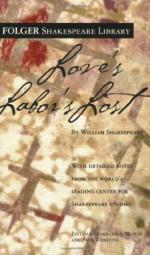|
This section contains 4,882 words (approx. 17 pages at 300 words per page) |

|
SOURCE: "The Early Comedies: Love's Labour's Lost" in The Early Shakespeare, The Huntington Library, 1967, pp. 128-42.
In the essay below, Hamilton discusses the importance of language in Love's Labour's Lost, in relation to spectacle, demonstrating how the words in the play call attention to themselves and to Shakespeare.
In the two other early comedies, Shakespeare makes exhaustive use of both the classical and much of the contemporary dramatic tradition. In Love's Labour's Lost, he borrows certain dramatic techniques from Lyly but goes far beyond him; his play, more like masque or opera than drama, suggests a sophisticated verbal imitation of the arts of music and painting, of the dance and folk festivities.1 It is like pastoral comedy, except that the chief characters are courtiers and their "pastoral" disguise appears only in the Masque of the frozen Muscovites. It is like romantic comedy, but for ending in a death...
|
This section contains 4,882 words (approx. 17 pages at 300 words per page) |

|


